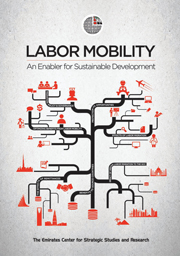Book contents
- Frontmatter
- Contents
- Figures and Tables
- Abbreviations and Acronyms
- Foreword
- Introduction
- 1 The Development Impacts of Temporary Migration and the Protection vs. Opportunities Trade-off
- 2 The Economic Development Benefits of Human Mobility to Source Countries
- 3 The Effects of Remittances
- 4 Recessions and Remittances in Home and Host Countries: An Overview
- 5 Seize the Spotlight: A Case for GCC Engagement in Research on the Effects of Labor Migration
- 6 Migration Policy and Governance in the GCC: A Regional Perspective
- 7 Optimizing benefits from Labor Mobility: The Case for Research Collaboration between Bangladesh and the GCC
- 8 Drivers of Development: The Impact of Indian Labor Migration to the GCC
- Contributors
- Notes
- Bibliography
- Index
7 - Optimizing benefits from Labor Mobility: The Case for Research Collaboration between Bangladesh and the GCC
Published online by Cambridge University Press: 05 September 2014
- Frontmatter
- Contents
- Figures and Tables
- Abbreviations and Acronyms
- Foreword
- Introduction
- 1 The Development Impacts of Temporary Migration and the Protection vs. Opportunities Trade-off
- 2 The Economic Development Benefits of Human Mobility to Source Countries
- 3 The Effects of Remittances
- 4 Recessions and Remittances in Home and Host Countries: An Overview
- 5 Seize the Spotlight: A Case for GCC Engagement in Research on the Effects of Labor Migration
- 6 Migration Policy and Governance in the GCC: A Regional Perspective
- 7 Optimizing benefits from Labor Mobility: The Case for Research Collaboration between Bangladesh and the GCC
- 8 Drivers of Development: The Impact of Indian Labor Migration to the GCC
- Contributors
- Notes
- Bibliography
- Index
Summary
Bangladesh has come a long way since being labeled a “bottomless basket” in the aftermath of its independence in 1971 by the then US Secretary of State, Henry Kissinger. In recent years its gains in terms of social indicators such as child mortality and female education, its youthful population and its confidence from gaining a foothold in the global apparel market have all resulted in the country being classed among the ‘new-wave economies’ alongside Vietnam, Indonesia, Turkey, Mexico, Argentina and South Africa. As a recent report in the Guardian highlighted:
As the west remains mired in gloom and even the BRICS (Brazil, Russia, India China and South Africa) start to plateau, attention is turning to this group of countries, many of which not so long ago were rudely dismissed as basket cases.
One of the important drivers of such positive change in Bangladesh is its vast reservoir of human resources, ready for deployment at home as well as in the international market to harness much coveted foreign currency. Even during the global financial crisis in 2007–2008, which also hit many emerging countries through falling western demand for their exports, the Bangladeshi economy has been particularly resilient, thanks to the remittances sent by its expatriate community.
This is not an isolated case of a positive portrayal of Bangladesh's success. In World Bank and World Trade Organization (WTO) rankings in 2010, Bangladesh was listed 21st fastest in terms of GDP growth.
- Type
- Chapter
- Information
- Labor MobilityAn Enabler for Sustainable Development, pp. 143 - 166Publisher: Emirates Center for Strategic Studies and ResearchPrint publication year: 2013



